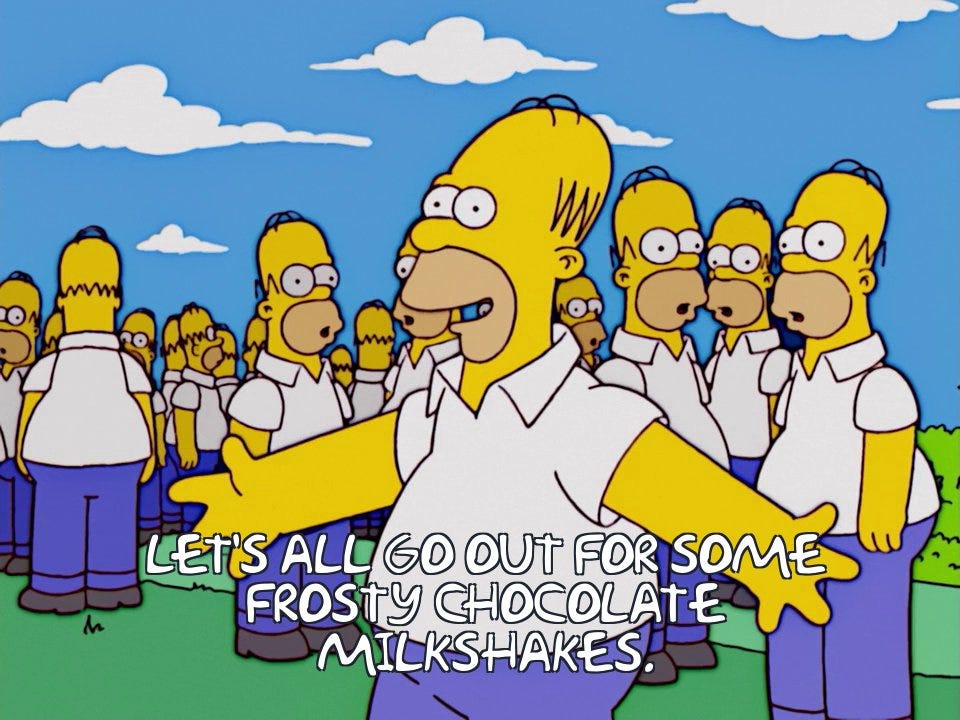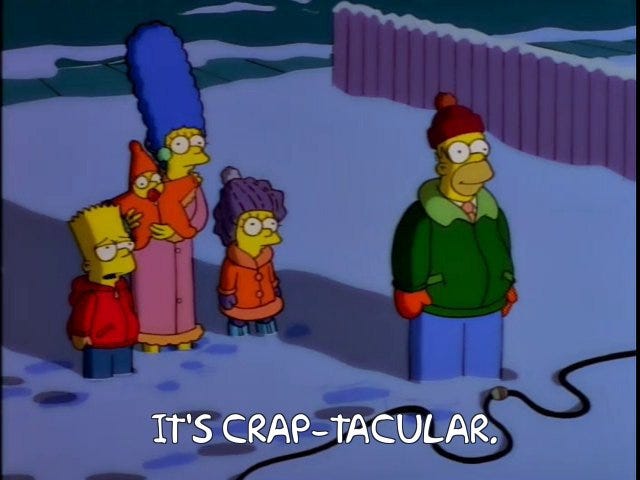A Zombie Simpsons Episode Guide
SEASONS ONE AND TWO
On rewatching and considering episodes for the seasons besides three to eight, I prioritized story arcs, character continuity, originality, and tonal balance even over the jokes. That is why I think many fans of the series’ storytelling will dig season two, though it never quite reaches the level of “comedic masterpiece”. Early on, the pieces are in place to have an emotionally developed and unique episode every time, and the humor style is recognizable, if not as dense and polished as it would become in season three. Co-creators Matt Groening, James L. Brooks, and Sam Simon were still actively engaged in the creative process at this point too, for what that’s worth. As far as I’m concerned, season two is surely golden era Simpsons, just with a couple asterisks (same as season nine).
Season one is merely an influential curiosity these days – rudimentary, slow and joke-light compared to what would follow. Not to mention the voices and animation are off, with only a handful of secondary characters in the picture. But there is a solitary ep I would call worthwhile: the start of the Sideshow Bob saga (directed by Brad Bird, no less)! In terms of “classic status”, I find it reasonable to give the debut year a pass, because of its historic nature, idiosyncratic tone, and notable brevity (only thirteen installments long). Such is the duality of life and the Simpsons, I suppose – starting wobbly and ending feebly.
A+
One Fish, Two Fish, Blowfish, Blue Fish [The show’s first exceptional entry, in my opinion.]
Homer Vs. Lisa and the 8th Commandment
Lisa’s Substitute [This episode alone makes watching the season worth it. Not to overhype! Best of season two.]
A
Two Cars In Every Garage and Three Eyes On Every Fish [The first few seasons had a surprising frequency of Mr. Burns stories. This may be the best of those.]
Bart Vs. Thanksgiving
Itchy & Scratchy & Marge
Bart Gets Hit By A Car [First Phil Hartman appearance, first Swartzwelder script where he has the show’s voice down. How could this not be a classic?]
The Way We Was [First backstory flashback, forming the basis of the Simpsons timeline.]
Oh Brother, Where Art Thou? [The series understandably forgot about Homer’s long-lost brother after two episodes, but Danny Devito made him amusing for a while.]
Bart’s Dog Gets An F [The few episodes about Santa’s Little Helper are inherently limited, but this one at least has novelty going for it. I give them a mulligan for one emotionally manipulative pet story done well.]
Old Money [You could call this story meandering, yet it’s an interesting structure where they breeze past the plot points you’d expect and wander into other narrative cul de sacs, while never losing focus on the characters. Many of these season two episodes work like that.]
Brush With Greatness
Three Men and A Comic Book
Blood Feud
A-
Treehouse of Horror [Very important to the show’s evolution, of course.]
Dead Putting Society [Early Flanders! A surprisingly well-rounded character considering what he became later, though that goes for everyone in the cast.]
Principal Charming
The War of the Simpsons [The first worthwhile “Simpson Marriage In Trouble” episode.]
B+
Krusty Gets Busted [Best of season one, not that there’s much competition. Yet this does feel like a rough version of the classic years.]
Bart Gets An F
SEASON NINE
My initial take on season nine was relatively bullish because of the fears I had that the show would go right off a cliff (which it did not). That super positive first assessment was also due to the series’ joke quality and pacing staying mostly intact. There was the infamous line-in-the-sand controversy of The Principal and the Pauper, but that episode can stand on its own despite the flagrantly misguided premise, and the season would stray from that surrealism in its highlights. To me, the characterizations are still largely on point throughout.
However, it took a rewatch focusing on the story coherence and emotional impact to realize that the plotlines began to weaken in season nine, something I had previously noticed in only a few spots. Truthfully, about half the episodes are either more mean-spirited or casually nonsensical than they should be, though fresh concepts, narrative focus and/or the density of gags save many of them from those drawbacks. Things are just carrying on from the relative darkness and deconstruction of late season eight, with a lower ratio of heartwarming or realistic plots.
Another complicating factor is the fact that the production cycle was a free-for-all, passing through four show runners and being written by teams of different old school writers. So in theory, this year should be as good as the ones that preceded it. Yet it does start to slip and deform, both out of desperation for new ideas, and due to the aforementioned sense of competition with its TV descendants.
Overall, going as hard on it as I could (through a variety of lenses), I would consider season nine as technically after the peak of the series, but in the same manner as the end of season eight. We’re barely starting to trek down the other side of the mountain here, rather than falling right off. There are three categories of problems present here: things that had already been happening in small amounts, factors beyond the creators’ control which would have cropped up anyway in a nine-year-old series, and variables the writers purposely messed with or ignored. So yes, the seams are starting to show, but this is still a great TV season by any metric. Clip show aside, there’s a baseline competence, with just two or three outright bad installments (the Simpsons almost managed to get to 200 episodes without a single total clunker). This may not be as immaculate as seasons four or six, but that’s no reason to cut it off from golden age status. In other words: definitely classic, yet fascinatingly flawed.
A+
The City of New York Vs. Homer Simpson [Sure it’s a bit awkward to watch now, but me and other fans agree that besides… you know… this is an all-timer.]
Bart Star [Best of season nine. I can’t find any nitpicks here.]
The Joy of Sect [Among its other good qualities, season nine feels like the last time the show was absolutely on top of trends and exploring novel themes, being first on the scene to satirize something. This is probably the final example of a definitive Simpsons cultural takedown, and a very risky one at that.]
Dumbbell Indemnity [Stories about secondary characters were a breath of fresh air and a necessity at some point in the series’ evolution, and they worked so long as they were tethered to a relationship in the main cast. That kind of expansive narrative focus carried over neatly from the prior few years, and though it would soon get thrown out of whack, this and This Little Wiggy below are aces.]
Lisa the Simpson [In many ways, Lisa is the heart of the show, and season nine was the last time she got more than one amazing episode. This one may undersell Bart and Homer, but not too badly.]
This Little Wiggy
A
Treehouse Of Horror 8
The Cartridge Family [Not necessarily dated or problematic, though I didn’t give it the A+ out of an abundance of caution. The moral also gets so muddled that both parties come off a bit badly. Damn, is it funny, though.]
King of the Hill [This gets a little exaggerated and wacky, yet John Swartzwelder nails the stories, tying them together well.]
Lost Our Lisa [The lesson at the end is a bit confused, but its heart is in the right place.]
Natural Born Kissers [A breezy execution of a novel premise that an earlier installment had only hinted at.]
A-
Lisa’s Sax [It’s not just the long All In the Family theme spoof that worryingly sets up negative Family Guy comparisons here (although that show hadn’t even started yet). The flashback grab bag structure is aimless and indulgent, but this ep is emotionally on point.]
Bart Carny
The Last Temptation of Krust [They would turn the tag of this one into its own story idea in season ten, which is an odd case. The last iconic Krusty episode.]
The Trouble With Trillions [Swartzwelder’s scripts are so funny I tend to forgive the later ones some frivolous foolishness. This and Bart Carny are good examples. After season eleven, however, even he couldn’t right the ship, which I suspect led to him getting restless and quitting by the fifteenth year.]
B+
The Principal and the Pauper [Contrary to its reputation, I think contemporary viewers will find this enjoyable, if not amazing. It’s an exercise in taking an ill-advised, preposterous premise, and making it as resonant and engaging as possible. The only place it starts to pile on too hard is the very end. And how crazy is it that Mad Men used this exact backstory for Don Draper?!?]
Realty Bites [Probably the last great Marge story, as well as introducing a couple late-era recurring characters, including the ad hoc replacement for Phil Hartman’s characters, Gil! Quite a strange B story, but it doesn’t hurt things that badly.]
Das Bus [A potential favorite, unfortunately saddled with the worst B-plot and most notable snide story copout of this list. The suspension of disbelief hurts fanciful premises like this too, creative as they may be.]
SEASON TEN
I alluded to the inevitable plummet in quality from classic Simpsons to post-classic Simpsons, and while it’s still an acceptable, even above-average batch of episodes, season ten is clearly what gets us there. It’s transitional – unbeknownst to audiences at the time, the series would later lose even more of its identity and appeal, so that this year would look rosy in comparison. And yet I would argue it’s already starting to become a different show. My issues with season nine have deepened, while a few new wrinkles appear. This is a distracted, cynical, surreal, and trend-chasing sitcom whose creators are beginning to get tired and frustrated in real time. They’re running out of ideas and trying wild experiments, not all of which pay off. They thought they were seeing the writing on the wall for the artistic or even literal end of the series. (The voice actors briefly quit and lobbied for new contracts during this season, and of course there’s Phil Hartman’s final appearance.)
This is the first year since the debut without an installment I would say is transcendently great, and even the high water marks are fewer in number. Meanwhile, the weakest episodes here would reach even lower lows than before, anticipating the range most filler entries would stay at for the rest of the show’s run. These changes become uncomfortable and grating, making this more of a gamble than season nine. An underlying factor is the wobbliness of the once-solid story structures. If they were decaying in season nine, season ten throws narrative sense out the window at times. This year is also where you can clearly notice the character tropes and distortions that would become the series’ downfall. For instance, this season leans incredibly hard on Homer and his foibles, for better or worse.
And yet, despite everything, I would assert that season ten has a definite resemblance to the tone, plotting, and characterization of the golden era, even if it’s an inconsistent echo. Please understand I’m being a stickler here and grading harshly – while watching the Simpsons in order, most of the encroaching problems were only damaging in retrospect and with full context, and so season ten is still largely enjoyable. The show was so great in previous years that it had a long way to fall before becoming less than quality programming.
No matter what issues there are here, I had the realization that this is the last time it’s worthwhile to dissect a season in full. Season ten is the final one worth considering on its own terms, since beginning with year eleven, the Simpsons would become consistently bad for the first time, and after that, it’s all just a blur. I think it’s significant that although you could look at these 22 episodes and not be hugely impressed, you could randomly choose 22 installments from the multiple decades after this, and I guarantee they would be worse. In fact, this season has a very solid opening four entries, if a bit too wacky or cruel to be masterpieces. Then the façade slowly fades, with the second half of the run featuring a few depressing clunkers (including the dreadful finale, which is the worst episode of the good years). But that’s getting into negatives again.
Besides its overarching issues, season ten shakes out favorably in a numerical sense. It’s a watchable, decent 22 episodes on average, with a tentative overall grade of B+. However, at this point it becomes clear what a low bar “consistently fine” is in comparison to the now-receding classic era. (For what it’s worth, this is markedly stronger than any following season – there’s an equally big gap in my grades between seasons nine to ten and ten to eleven.) Given the large fumble in quality control, I wouldn’t put it into the pantheon of absolute masterpiece years, but I can’t fully write it off either. With a bit of good will and bias towards the greatest TV comedy, I’ll give it a pass and generously round up to a nice even number. To me, the golden age of the Simpsons is the first ten years.
A
Lard of the Dance [Nonsense Homer adventures and odd jobs start to creep in by now, though this works as a one-off. Probably best of season ten, if only for the Lisa story. Although she had one-episode foils before this, the “maturity” angle is fresh.]
The Wizard of Evergreen Terrace [A tiny bit of Jerkass Homer, but it would get so much worse, and the story is good, with classic gags.]
Wild Barts Can’t Be Broken [The climax is a top five Simpsons original music moment for me, which redeems the kinda nasty beginning. One thing the show never lost its way with was the fantastic integration of songs.]
Mom and Pop Art [The perfunctory yet sweet ending saves a character conflict that could have gone off the rails. Otherwise, very creative!]
A-
Treehouse Of Horror 9 [The already surreal Treehouse episodes took a bit longer than the rest of the series to get stretched out of proportion and milked for all they were worth. One Jerry Springer guest role aside, this is still some quality Halloweenery.]
Mayored To the Mob [Just a well-written comedy story that never loses focus or falters.]
Homer To the Max [Probably the first canonical ep to get weirdly meta. I gave it a pass this once, for being clever and original at the time.]
Simpsons Bible Stories [Shout out to the Treehouse-aping historical anthology episodes, beginning right here! Strangely enough, this categorical niche is one of the more reliable story engines for the mid-to-late show because the writers have a premade plot to follow that doesn’t involve anything these characters have already done, and they can just lay good jokes on top.]
B+
Bart the Mother [Phil Hartman’s last appearance. Come to think of it, this is vaguely similar, and inferior to, Marge Be Not Proud. If you can see the thematic parallels, then you understand how strict I’m being with the series repeating itself.]
D’oh-in In the Wind [Eventually the Simpsons’ young boomer/old Gen X-er pedigree would render it cringey and slow on its feet with contemporary satire, but this is the last episode to proudly, productively wear that generational influence on its sleeve.]
I’m With Cupid [I feel lukewarm on this one, though it basically has a sound structure and characters act like they should (despite some tedious gender stereotypes). However, things are starting to slip at points in the second half of season ten.]
Marge Simpson In: Screaming Yellow Honkers [The episode derived from The Last Temptation Of Krust’s ending. Despite the self-plagiarized premise and some straining of believability, it’s fun.]
The Old Man and the C Student [Although many of season ten’s recommendations have qualifiers, this trifling entry is proof that a Simpsons B+ is a delightful romp by less strict standards.]




